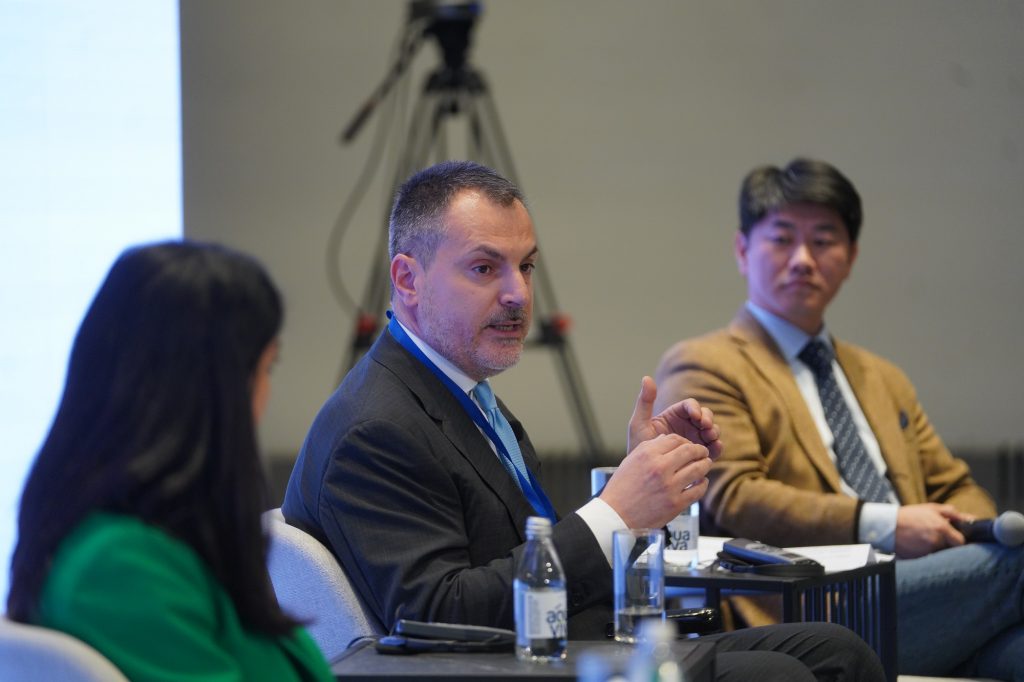The two-day conference “Ten Years After the 2014 Floods” organized by UNDP and with the support of EU, was held in Belgrade on 22 and 23 October. The Conference brought together representatives of governments, international development partners and decision-makers in the field of disaster risk financing from the Western Balkans, with the aim to strengthen regional cooperation in building disaster resilience within the framework of EU integration of the Western Balkan countries.
Mr. Francesco Masci, Chairman of the Executive Board of DDOR participated on a second day panel “Development of approach for disaster risk financing across the Western Balkans”. He pointed out the main governance climate-related initiatives integrated into DDOR as well as the main pillars integrated into the Group strategy, which is contributing to the Sustainable Development Goals of the UN 2030 Agenda in its three main areas of intervention (underwriting, financial investments and real estate activities), gearing up to facing climate-related risks and seizing climate-related opportunities.
Further on, Mr. Masci spoke about how DDOR is integrating sustainability and climate risk management into company’s products and services, as the top emerging risks remain at the core of the Group strategy, as well as the actions taken at the group level to tackle and mitigate them. Also, he emphasized that the insurance sector can enable dedicated measures to contribute to a safer and more economic environment, including use of technological solutions and use of available data to place the community interest first.
“Climate change remains at the core of the Group strategy, by adopting a forward-looking and holistic approach, which is on full display with the Group Emerging Risk Management Framework, where the top 10 emerging risks, including climate change, are identified and their interconnectedness is assessed along with their impact and the actions taken by the Group to tackle and mitigate them. With regard to the products and services being offered, it is worth mentioning those solutions crafted to support the mitigation or adaptation to climate change, the introduction of climate risk pricing models, the set-up of a dedicated solutions-factory named Leithà which commits to developing data-intensive solutions and applications, the development of risk prevention and claims’management support tools, the issuance of the Green Bond, and last but not least, the development of public-private partnership projects”, he added.
“Among the key takeaways and top priorities to strengthen risk financing across West Balkan countries, certainly it is worth stressing the critical role which might be played by the public-private partnership as H1 2024 figures on natural disasters confirm the heightened climate change risk. In addition, while on the one hand the available data on insured losses skew the global pattern of economic costs towards the wealthier nations and regions, on the other disasters are anything but impartial as they undo decades of hard-won progress when they strike the poorest countries. In addition, there is an invisible economic, developmental and social toll of disasters, which is compounded by the high protection gap. Besides, good governance is critical to curtail disaster risk. However, habits will be changed only when the green transition will become sustainable from both an environmental and economic point of view, therefore it is paramount to align the engagement of all the relevant stakeholders, with our ambition to an equitable climate action”, he concluded.
On the second day of the conference, an upgraded version of the Disaster Risk Register was presented. This geographic information database containing all identified risks for the territory of the Republic of Serbia, now also includes data on health risks and crucial information for protecting public health in emergency health situations and natural disasters, such as the data on capacities of healthcare institutions.
The Study presented on the Conference foresees that due to climate change, floods are expected to be an increasing risk in Serbia. However, if a situation like the 2014 floods were to occur today, the damage in Serbia would be up to 90 per cent less in certain places. It is indicated that flood damage would be significantly reduced because of the improvements in the legal framework, better coordination between institutions in disaster prevention and response, investments in flood defense infrastructure, and implemented professional development programs in risk management.






